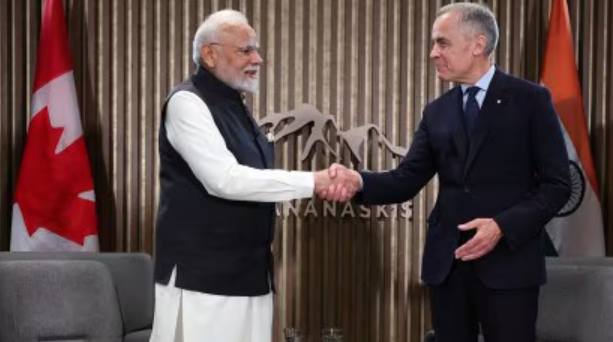India and Canada have agreed to reinstate ambassadors to each other’s capitals, marking a significant diplomatic reset after nearly two years of tension stemming from the 2023 killing of Sikh separatist Hardeep Singh Nijjar on Canadian soil.
Diplomatic Breakthrough at G7
Prime Minister Narendra Modi and Canadian PM Mark Carney met on June 17 at the G7 summit in Alberta, agreeing to appoint new high commissioners. Both leaders emphasised mutual respect, sovereignty, and restoring normal consular services for citizens and businesses in both countries.
Background of the Spat
The diplomatic crisis began in September 2023, when then–Canadian PM Justin Trudeau alleged Indian government involvement in Nijjar’s killing near Vancouver. India vehemently denied the accusation, citing Nijjar as a terrorist, not an activist. This led to reciprocal expulsion of diplomats, visa suspensions, and a freeze in high-level talks.
Intelligence Partnership Resumes
Alongside the ambassadorial exchange, India and Canada agreed to renew intelligence-sharing on counterterrorism and transnational crime. Carney described this as a foundational step enabled by frank discussion on law enforcement cooperation and “transnational repression”.
Public Reaction and Community Concerns
Modi’s presence at the summit sparked protests from Canada’s Sikh community, who accused Carney of sidelining human rights concerns by engaging Modi before accountability on the Nijjar case. Carney responded that he needed to be cautious about commenting further on the case while legal processes continue.
Economic and Strategic Implications
Bilateral trade—valued at about US $9 billion in 2023—had suffered due to the dispute. Carney and Modi also discussed cooperation in technology, food security, energy, AI, and critical minerals, signalling intent for a deeper strategic partnership.
Significance and Challenges
Restoring full diplomatic representation is an essential first step toward repairing strained ties. But unresolved issues linger—Canada continues its investigation into Nijjar’s killing, and concerns remain over Indian activists in Canada and political surveillance. Both sides acknowledge the need for tougher communication channels and rule-of-law assurances.
This reset signifies a pragmatic recalibration by India and Canada, prioritising shared values and mutual interests—while recognizing that full restoration of trust will depend on sustained dialogue, transparency, and robust legal cooperation.











